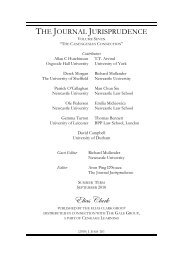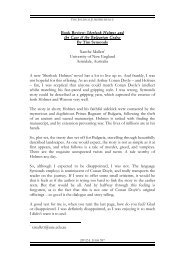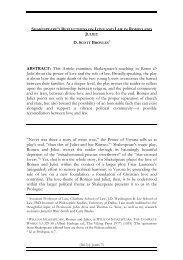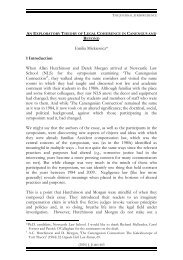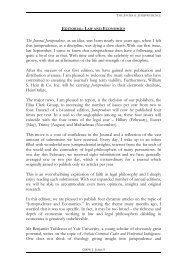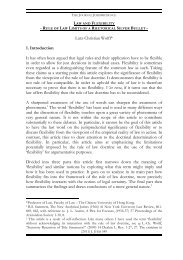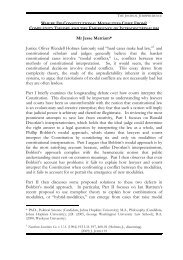On the Formation of the American Corporate State - The Journal ...
On the Formation of the American Corporate State - The Journal ...
On the Formation of the American Corporate State - The Journal ...
You also want an ePaper? Increase the reach of your titles
YUMPU automatically turns print PDFs into web optimized ePapers that Google loves.
SKOURAS ON THE FORMATION OF THE AMERICAN CORPORATE STATE:THE FULLER SUPREME COURT, 1888-1910to why this was <strong>the</strong> case--- given that Europe had more embedded conservativeinstitutions than <strong>the</strong> New World--- might be this: <strong>the</strong> fragmentation <strong>of</strong><strong>American</strong> society via racial, ethnic, religion, language, unbounded immigration,and flood <strong>of</strong> entering immigrants from Eastern and Sou<strong>the</strong>rn Europeancountries that were mostly <strong>of</strong> peasant stock, uneducated, poverty stricken, etc.served as a hedge to unifying labor and defusing <strong>the</strong> need to establish an<strong>American</strong> Labor Party that could effectively challenge <strong>the</strong> Bigness <strong>of</strong> <strong>the</strong> newCorporation at <strong>the</strong> dawn <strong>of</strong> <strong>the</strong> Industrial Era. “In Europe industrializationuprooted <strong>the</strong> peasants from <strong>the</strong> land and brought <strong>the</strong>m to <strong>the</strong> cities, where <strong>the</strong>ybecame revolutionary workers. But <strong>the</strong> uprooted European peasants whosettled in <strong>American</strong> cities remained conservative. In America <strong>the</strong> farmers whostayed on <strong>the</strong> land played <strong>the</strong> role <strong>of</strong> European workers as a major forcechallenging industrial capitalism.” 61 That is, <strong>the</strong> continuous flow <strong>of</strong> immigrantsat <strong>the</strong> dawn <strong>of</strong> industrialization was able to fragment labor and prevent or blunt<strong>the</strong> radicalization <strong>of</strong> <strong>the</strong> worker. <strong>The</strong> corporations were able to take advantage<strong>of</strong> <strong>the</strong> situation, in fur<strong>the</strong>r dividing and fragmenting <strong>the</strong> <strong>American</strong> populace; sothat Labor lacked common interest and ability to coordinate and react to <strong>the</strong>consolidation <strong>of</strong> corporate power.Ely’s revisionist defense seems to be that if society at large could not stomachlabor unions, could <strong>the</strong> Court do no o<strong>the</strong>r? Like Ackerman, Ely accepts <strong>the</strong>proposition that <strong>the</strong> Court was a part <strong>of</strong> a culture that valued property above allelse and could do no o<strong>the</strong>r. However, unlike Ackerman, Ely seems to recognizethat <strong>the</strong> Court did start to feel some unease with its property over laborprinciples.What are <strong>the</strong> limitations <strong>of</strong> Ely’s approach and <strong>the</strong> Lockean School <strong>of</strong> thought?This School is wedded to <strong>the</strong> idea that because <strong>the</strong> Fuller Court viewedproperty as a precondition to liberty, it was justified in making that equation.That is, Ely and o<strong>the</strong>rs <strong>of</strong> <strong>the</strong> classical liberal school assume Fuller’s taming <strong>of</strong><strong>the</strong> Due Process Clause to comport with Lockean philosophy was justified.<strong>The</strong>y share a philosophy <strong>of</strong> limited government, individualism, free markets,and strong protection <strong>of</strong> property. Natural law may have served a function inpre-Copernicun times or in Medieval <strong>the</strong>ology, but its continued use could onlyserve establishment and property interests. <strong>The</strong> Fuller Court was not unawarethat <strong>the</strong> use <strong>of</strong> natural law was no longer free <strong>of</strong> controversy. And <strong>the</strong>Progressives aptly pegged <strong>the</strong> Fuller Court for what it was---a stalwart <strong>of</strong>business and an impediment to labor.61 MICHAEL PAUL ROGIN, THE INTELLECTUALS AND MCCARTHY at 187.(2011) J. JURIS 54



